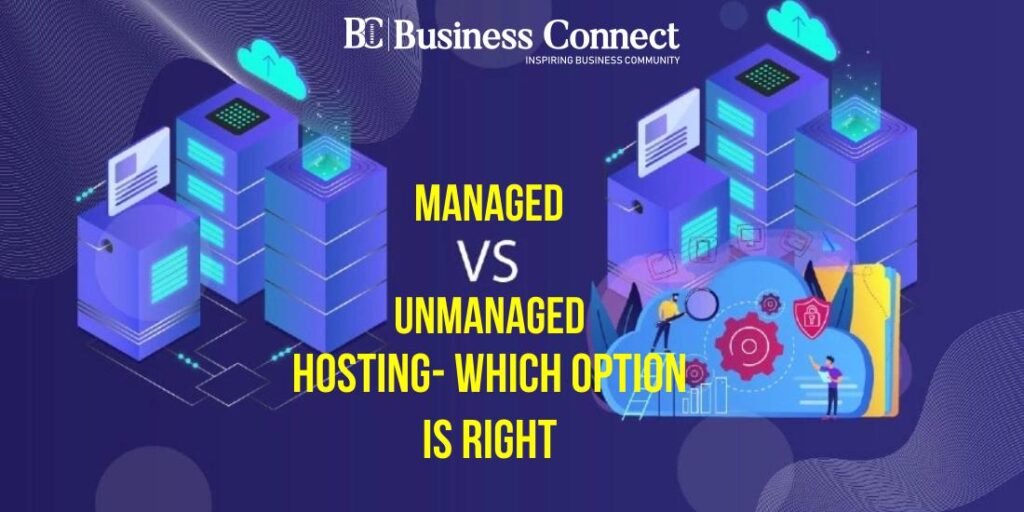Managed Vs. Unmanaged Hosting- Which option is right
Introduction: When choosing a hosting service for your website, you’ll likely come across the terms “managed hosting” and “unmanaged hosting.” These two options represent different levels of control, support, and responsibility that you have over your hosting environment. Understanding the differences between managed and unmanaged hosting is crucial in selecting the option that aligns with your technical expertise, resources, and specific website needs.
Difference between Managed and Unmanaged Hosting
In this article, we’ll explore the key features, benefits, and considerations of both managed and unmanaged hosting to help you make an informed decision.
What is Managed Hosting?
Managed hosting is a comprehensive hosting solution that provides users with a fully managed environment, where the hosting provider takes care of the technical aspects of server management.
Here are some key features of managed hosting:
1. Server Management
With managed hosting, the hosting provider handles server setup, configuration, maintenance, and monitoring. This includes hardware and software updates, security patches, performance optimization, and backups. The provider ensures that your website operates smoothly and remains secure, allowing you to focus on your content and business goals.
2. Technical Support
Managed hosting often includes dedicated technical support from experts who are well-versed in the hosting environment and related technologies. They can assist with troubleshooting, addressing technical issues, and providing guidance on optimizing your website’s performance. This level of support is especially beneficial for users who lack technical expertise or prefer to have professional assistance readily available.
3. Scalability and Flexibility
Managed hosting providers typically offer scalable solutions, including Linux VPS allowing your website to handle increased traffic and resource demands. They can accommodate growth and fluctuations in website requirements, ensuring your site remains accessible and responsive to visitors. Managed hosting plans often come with flexible resource allocation, allowing you to scale up or down as needed.
4. Enhanced Security
Managed hosting providers prioritize security measures, implementing robust firewalls, regular malware scans, and proactive threat monitoring. They keep up with the latest security patches and updates to protect your website from potential vulnerabilities. This level of security is particularly valuable for e-commerce sites or websites handling sensitive user data.
What is Unmanaged Hosting
Unmanaged hosting, also known as self-managed or DIY hosting, puts the responsibility of server management and technical tasks on the website owner or administrator.
Here are some key features of unmanaged hosting:
1. Full Control
With unmanaged hosting, you have complete control over the server and hosting environment. You can choose the software, configurations, and settings that best suit your needs. This level of control is advantageous for users who require specific customizations, have advanced technical knowledge, or prefer to manage their own infrastructure.
2. Cost-Effectiveness
Unmanaged hosting is often more affordable compared to managed hosting since you are responsible for the server’s management and maintenance. This can be a cost-effective solution for users who are comfortable handling technical tasks and have the necessary expertise.
3. Technical Expertise Required
Unmanaged hosting assumes that you have a good understanding of server administration, software installation, security configurations, and troubleshooting. It is suitable for users who have experience with server management or are willing to invest time and effort in learning and managing their hosting environment.
4. Support Limited to Infrastructure
With unmanaged hosting, support from the hosting provider is typically limited to infrastructure-related issues such as hardware failures or network connectivity problems. Additional technical support for website-related issues or software installations may not be included, and you may need to rely on online resources or external support services.
Choosing the Right Option
When deciding between managed and unmanaged hosting, consider the following factors:
1. Technical Expertise
Assess your comfort level and expertise in server administration, maintenance, and troubleshooting. If you lack technical knowledge or prefer to focus on your website content rather than server management, managed hosting is a better option.
2. Scalability and Support
Consider your website’s growth potential and resource requirements. If you anticipate significant growth or require dedicated support for technical issues, managed hosting offers the scalability and comprehensive assistance you need.
3. Budget
Evaluate your budget and cost considerations. Managed hosting tends to be more expensive due to the added services and support provided. If you have budget constraints or prefer a more hands-on approach, unmanaged hosting might be a more suitable and cost-effective choice.
4. Security Needs
Assess the sensitivity of your website’s data and the level of security required. If you handle sensitive information or prioritize robust security measures, managed hosting offers enhanced security features and regular updates to protect your site.
Managed vs. Unmanaged Hosting: A Head-to-Head Comparison
| Features | Managed Hosting | Unmanaged Hosting |
| Server Management | Fully managed by the hosting provider | Self-managed by the website owner/administrator |
| Technical Support | Dedicated support from hosting provider’s experts | Limited support for infrastructure-related issues |
| Scalability | Easily scalable to handle increased traffic and resource demands | User-managed scalability based on technical knowledge |
| Security | Robust security measures implemented by the hosting provider | User responsibility for implementing security measures |
| Cost | Typically higher cost due to added services and support | More cost-effective as the website owner handles server management |
| Control | Limited control over server configuration and settings | Full control over server and hosting environment |
| Technical Expertise | No technical expertise required | Advanced technical knowledge needed for server management |
Conclusion
Choosing between managed and unmanaged hosting depends on your technical expertise, budget, scalability needs, and the level of control you desire. Managed hosting provides a fully supported and hassle-free experience, ideal for users who prioritize convenience, support, and scalability.
Unmanaged hosting offers full control, cost-effectiveness, and customization options, making it a suitable choice for experienced users with specific requirements and technical skills. Carefully assess your needs and priorities to determine which option best aligns with your website goals and resources.



